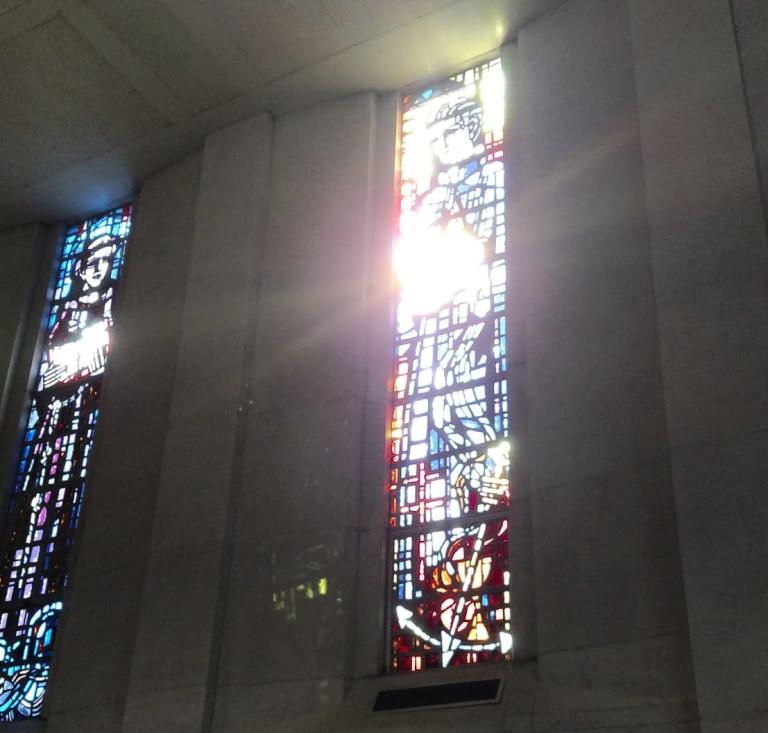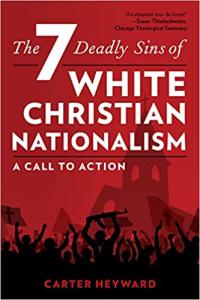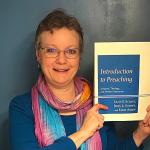Why should a congregation celebrate Christ the King Sunday? It’s one way to push back against Christian Nationalism.

For churches that follow the liturgical calendar, Christ the King Sunday is the last Sunday of the liturgical year. It’s celebrated on the Sunday before the beginning of Advent, usually sometime between Nov. 20-26.
This feast day celebrates Christ Jesus who sits at the right hand of God and reigns as Lord of all in heaven and on earth. It anticipates the final judgment of God when Christ will come again to rule in peace and justice.
I have to admit that for most of my years as a pastor, I was uncomfortable with the overt patriarchy and hierarchy inherent in Christ the King Sunday.
Images of crowns, thrones, and scepters are prominent on this feast day. But these symbols stand in stark contrast to other, more humble images of Jesus with a crown of thorns. Or washing the feet of his disciples. Not to mention riding on a donkey on Palm Sunday. So I have felt conflicted about recognizing this feast day in the church.
However, when I learned the history behind Christ the King Sunday, my perspective shifted.
I’ve come to realize that Christ the King Sunday is an ideal time to raise awareness about Christian Nationalism and to firmly proclaim where the church stands in regard to this threat to democracy and to the tenets of Christianity.
What is Christian Nationalism?
According to Andrew Whitehead and Samuel Perry, “Christian nationalism is a cultural framework – a collection of myths, traditions, symbols, narratives and value systems – that idealizes and advocates a fusion of Christianity with American civic life,” (Taking America Back for God: Christian Nationalism in the United States [Oxford University Press, 2020], 10). Researchers at PRRI and Brookings estimate that nearly one-third of Americans adhere to Christian Nationalist beliefs.

A related term is christofacism. In her book, The Seven Deadly Sins of White Christian Nationalism, Carter Heyward explains that christofascism is “a seductive form of authoritarianism taking shape among us in the guise of Christian faith and all-American values, especially the value of liberty, or freedom, even at the expense of the common good” (xii).
A term first coined by the German theologian Dorothee Soelle, christofascism is the unholy trinity of Christianity, capitalism, and Republican political power. As early as the 1980s, Soelle recognized the beginnings of theocracy made in the image of rich, white Christian men – exactly as she saw in fascist Germany in the 1930s.
This brings us to Christ the King Sunday, a feast day instituted in direct response to the fascistic forces at work in the world nearly a century ago.
What is the origin of Christ the King Sunday?
In 1925, following World War I, Pope Pius set forth the encyclical Quas Primas (Latin, “in the first”), creating the feast day of Christ the King.
It was the same year Hitler published Mein Kampf and Mussolini assumed dictatorial power in Italy. It was also the year following Stalin’s takeover as successor to Lenin in Russia.
In the face of rising totalitarianism at that time, Christ the King Sunday proclaimed the kingship and reign of Christ stands in profound contrast to all earthly claims to lordship over human life.
Christ the King Sunday reminds us that, unlike tyrants and dictators, Jesus is the just and faithful one who brings order and peace to the world – when we follow his command to love one another.
In our current time, Christ the King Sunday provides an important liturgical opportunity to stand against — and speak out about — Christian Nationalism.
As christofascism has gained ascendency in local school boards, state houses, and the halls of Congress, it’s important to remember that this is not the first time the church has faced this malevolent abuse of power.
The ideologies and tyrants of the 20th century who prompted the feast day of Christ the King insisted that the individual exists to serve the state. The church responded correctly that this is not true – in fact, we exist to serve God and our neighbor. It is Christ to whom Christians owe their allegiance. It is to the reign of mercy that we owe fidelity. And it is Christ’s command to love one another that we obey.
So, when certain leaders insist that the United States of America was intended to be a “Christian nation,” Christians must counter with the truth.
And the truth is that the U.S. is a country that protects the rights of all religious expressions, only one of which is Christianity. Christians have the freedom to practice their religion, but they do not have the right to impose their religious beliefs on others through the mechanisms of the state.
This means that policies of discrimination against LGBTQIA+ people, and sanctioning public prayer in schools, and eliminating a woman’s right to bodily autonomy – all of which are justified by some people’s definition of “Christian” beliefs – are unconstitutional. In addition, they are not actually Christian at all.
Christianity was a movement that did not find its origins in the dictates of religious leaders but rose up from the common people. Jesus sought to change the hearts and minds of people to live in accordance with God’s justness and righteousness, not to impose a singular belief system from on high.
In other words, Christianity was never intended to be a theocracy.
Instead, Jesus was trying to reform the existing religious structures so that they aligned more closely with the call of the prophets to return to the covenant based on the command to love God and neighbor.
If a theocracy was intended, Jesus would have chosen a chariot over a donkey. He would have organized his followers to rise up and violently overthrow Rome. But he did none of this. Because that is not the kind of power Jesus exercised.
We have to understand that when we speak about “Christ the King,” we are talking about something very different than what the world understands about power, leadership, authority, and strength.
We are talking about the Servant King who turned away from all the trappings and temptations of temporal, mortal power (see Matt. 4:1-11). Instead, Jesus chose to exercise power through the qualities of human relationship that engender trust, sacredness, and precious regard for “the least of these.” They are the ones Matthew tells us about in his parable, those whom the world considers God-forsaken, but are, in fact, the very face of Jesus (Matt. 25:31-46).
Why do we say, “Jesus is Lord”?
“Jesus is Lord” was the ancient confession by the early church and stood in direct contrast to the expression that “Caesar is Lord.” In other words, no human ruler can lay claim to your body or your allegiance. It can only earn the trust of a people who agree to work together toward the common good and to follow the rule of law that curbs sin and protects the vulnerable.
This is why Pilate’s question to Jesus is so pivotal. When Pilate asked Jesus “Are you a king?” (John 18:33-37), it’s the question that all the powers and principalities are asking. It’s the question we’re asking as well. We want to know – who is lord of the universe? Is it a human ruler? Or the almighty dollar? Is it the one with the biggest weapons and most powerful technology?
What scripture tells us is that, no – glory belongs to the Lamb of God.
Did you ever wonder why Jesus is called the Lamb of God?
Because it was the lamb who was slain on the cross. (See John 1:29, Revelation 12:11, 17:14, 22:3.) The lamb symbolizes the vulnerable, especially children. And it is always the children who are slain by imperialism, by war, by domestic abuse, by any form of arrogance and domination. It is always the children and those most vulnerable who suffer when some other entity or person takes it upon themselves to say that they are the ruler of the universe.
It’s that lamb we have to guard and protect within ourselves and in our communities. It is the human vulnerability that we have to honor if we want to worship the true king, Jesus the Christ.
Christ the King Sunday is in a liminal place.
Christ the King Sunday is poised between the end and the beginning of the church year. It’s in a liminal place, a time of transition. It’s a boundary, a threshold between converging forces. Just as Jesus hung between the mocking crowds and those who cried out to be remembered, it is in that liminal space where Christ is King.
That’s exactly where the Church which bears Christ’s name needs to be, as well. We need to stand in the gap between those who use the church as a cover for their authoritarian designs and the ones who are demonized and destroyed by the wielders of christofascist power.
We also need to stand in those liminal places of unbearable complexity, such as the ancient conflict between religious extremists in the Middle East. And we must unequivocally advocate for peace and the protection of children.
Christ the King Sunday is about the Cosmic Christ.

Christ the King Sunday is also a time to recognize that Jesus’ crucifixion and resurrection is not just for the salvation of human beings, but for the very Earth itself. (See John 1:1-3, John 3:16, Romans 8:22, Colossians 1:15-17.) This is the Cosmic Christ who locates himself not just in the heights of the heavens, but in the depths of the soil that birthed him, took him in after his death, and rebirthed him on Easter morning.
Thus, we cannot sing about this “feast of victory for our God,” without also remembering that on Good Friday, we sing about the “sacred head now wounded.” The crucifixion story tells us that when Christ became yet another victim of state-sanctioned murder, the sun became dark and the whole earth shook. The temple curtain was torn in two. That detail is referring to an ancient Jewish teaching that when a just person is killed unjustly, the holiness of God is injured. The whole earth trembles.
This is why Jesus’s “throne” is the cross (Philippians 2:6-11). The crucifixion is a cosmic experience!
Thus, when another species becomes extinct as a result of human sin, the whole universe is rent in two. When a person is raped, the whole universe shudders. When a child is shot in their school, the entire cosmos shakes. God suffers and dies every time another crucifixion happens in our world.
But remember that after the dust settles and the gravestone is in place, and the only sound is weeping in the garden – that is when the Risen Christ appears.
Notice that after the resurrection, no one says, “We have seen Jesus.” No, they say, “We have seen the Lord.” The Lord has risen. The Cosmic Christ, the Lamb of God, the victim of violence, the child in the school, the last bird of the species – all of those who have died because of human sin – will rise in Christ.
This is what we mean when we talk about Christ the King. This is what we sing about in our hymns. This Cosmic Christ — this radiant, vulnerable, suffering, resurrected one — is who we trust. And he is the one who calls us to live out that trust through our actions infused with divine love.
Thus, Christians must model their servant leadership on who Jesus is, what he did, and what his kingship means for all of humanity and the rest of Creation. Because Christ the Risen King is the one who we worship.
Biblical foundations of Christ the King Sunday
Here are the readings assigned for Christ the King Sunday in the three years of the lectionary cycle. In the weeks leading up to the feast day, consider doing a Bible study on these verses and consider what they mean for a church standing against Christian Nationalism.
Year A
Ezekiel 32:11-16, 20-24. The Lord will be the shepherd (good king) to care for the people (sheep) and a new king will rule with justice and righteousness.
Psalm 95:1-7a. We are the people of God’s pasture.
Ephesians 1:15-23. The resurrected Christ is Lord of the church and universe, now and forever.
Matthew 25:31-46. God’s judgment/justice and Christ’s kingdom is shown by caring for “the least of these.”
Year B
Daniel 7:9-10, 13-14. The kingdom of God is an everlasting kingdom.
Psalm 93. The Lord is King.
Revelation 1:4b-8. Jesus Christ, the faithful witness, is the firstborn of the dead and the ruler of the kings of the earth.
John 18:33-37. Pilate asked, “Are you the king of the Jews?” Jesus answered, “My kingdom is not of this world.”
Year C
Jeremiah 23:1-6. A word of judgment on the failed leaders and a word of promise for a righteous king to rule over the people.
Psalm 46. A hymn celebrating the reign of God who is our refuge and strength.
Colossians 1:11-20. Christ is the “image of the invisible God,” the living presence of God’s kingdom and rule.
Luke 23:33-43. Jesus hung from the cross under a sign with an inscription, “This is the King of the Jews.” One of the criminals asked, “Jesus remember me when you come into your kingdom.”
Many thanks to LaVinnia Pierson, Steering Committee member in the Clergy Emergency League, for her research and contributions to this article. And to Robert Franek, also a member of the CEL Steering Committee, for his editing and contributions.
Read also:
Christ the King Sunday: The Cosmic Juxtaposition
Countering the Temptations of Christian Nationalism: Matthew 4:1-11
Gathering Up the Fragments: Sermon on Mark 13:24–37

The Rev. Dr. Leah D. Schade is the Associate Professor of Preaching and Worship at Lexington Theological Seminary in Kentucky and ordained in the ELCA. Dr. Schade does not speak for LTS or the ELCA; her opinions are her own. She is the author of Preaching in the Purple Zone: Ministry in the Red-Blue Divide (Rowman & Littlefield, 2019) and Creation-Crisis Preaching: Ecology, Theology, and the Pulpit (Chalice Press, 2015). She is the co-editor of Rooted and Rising: Voices of Courage in a Time of Climate Crisis (Rowman & Littlefield, 2019). Her newest book is Introduction to Preaching: Scripture, Theology, and Sermon Preparation, co-authored with Jerry L. Sumney and Emily Askew (Rowman & Littlefield, 2023).













